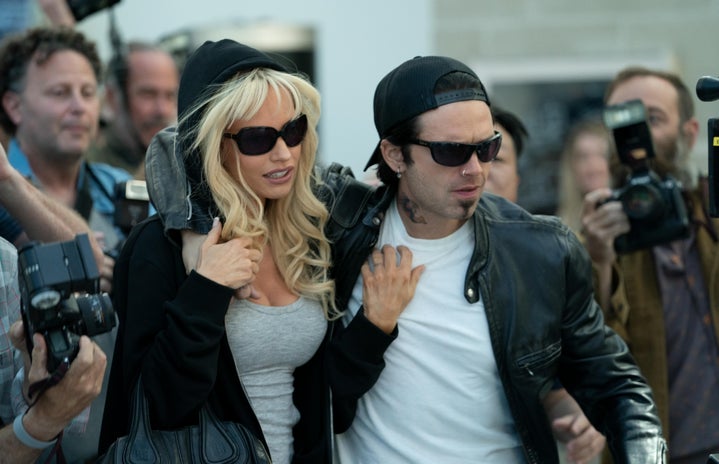With the limited series ending last week, I have been dying to talk about this show that I started reluctantly watching and have carefully watched to the end.
What intrigued me about “Pam and Tommy” was that I love the ‘90s, the title couple is played by two of my favorite actors, and it seemed like it would be giving a new voice to Pamela Anderson, who in a modern light, was done so wrong by this infamous crime. Also, they make it clear throughout that this was a crime, as in this tape was stolen from their home. This is really important given that many times throughout the show the couple has to fight allegations that they sold the tape themselves for publicity.
Spoilers Ahead!
The show covers Pamela Anderson (Lily James) and Tommy Lee’s (Sebastian Stan) relationship from the whirlwind beginning to the lengthy fallout from the theft and release of the tape they made on their honeymoon. After Lee refuses to pay and fires Rand Gauthier (Seth Rogen), the carpenter working on his mansion, Gauthier gets revenge by breaking into Pam and Tommy’s home and stealing their safe. In addition to Lee’s firearms and Anderson’s jewelry, the safe contained an inconspicuous tape. He goes to his friend, porn director nicknamed Uncle Miltie (Nick Offerman), and they find out the tape’s explicit nature. They then go on to sell it using the emerging power of the internet. The tape wreaks havoc on the couple’s lives; Pam’s career is destroyed by the tape, and she has to grapple with basically being public property due to her status as a sex symbol.
The show adds so much to Anderson, something that would have been unthinkable in the mid-’90s when this all went down. She is optimistic, shown in flashbacks to when she first started modeling for Playboy. She is insightful and smart, constantly battling with lawyers throughout the series for her rights to the tape but constantly being shut down by the men around her. She is determined, shown with her auditioning for new movies and shows and trying to break from the blonde, red-bathing suit-clad sex symbol she was known as. Unfortunately, this determination is dashed by the impact of the tape on her image. She gives up during the series finale and agrees to sell the rights to the tape, hopeless and waiting for the whole scandal to end.
It really is admirable how sympathetic Pamela is throughout the series. One of my favorite scenes from the show is after a horrible and embarrassing deposition, where the lawyers ask extremely invasive questions about her body and sexuality. Pamela has a short speech where she says that people will always feel that they have ownership of her body, and people will never see the tape as a violation of her privacy because she had the audacity to be on Playboy and wear a swimsuit on television. It lends to a larger conversation about women’s agency over their body and sexuality, and the disrespect that women have faced over time over sex and promiscuity.
Tommy Lee is shown as an ambiguous character as a doting husband to Pamela but ultimately has violent tendencies and is very cruel toward her and others. Whereas Pamela is shown as the innocent victim of this story who never did anything to deserve this. Which is a fair conclusion that should have been made 27 years ago. In the finale, Lee asks the man who stole the tape what she– not them as a couple– what she did to deserve this.
So, this tells a compelling story about women’s consent and the public perception of the real people behind this scandal.
But, they are real people.
And Pamela Anderson wasn’t involved.
According to an article by Entertainment Weekly, while the actress was reached out to numerous times during production, she has no interest in watching it. Who would want to be involved in a huge streaming production about a scandal that turned you into a punchline, violated you, and practically ruined your career? Anderson in the series is clearly traumatized by the ordeal. Would this be making her relive this trauma all these years later?
So, the show ends up doing the same thing they’re trying to subvert. In the 1990s, Pamela Anderson was deemed public property because the consensual explicit content she made supposedly justified the nonconsensual content that was stolen from her. In the 2020s, she is still deemed as public property for the sake of television.
The show still does make some really insightful and nuanced takes on women’s consent and ownership, but this whole message is undermined by this. When will people listen to Pamela Anderson? When will women be more than just content?
An Entertainment Tonight article explains how the series is “painful” for Anderson. Her portrayer Lily James wanted to give an authentic performance (which as little as I know about the scandal before this, I do think she did a good job), but her attempts to reach Anderson were fruitless. On the other hand, the article also explained, Tommy Lee gave his approval to portrayer Sebastian Stan, which is great for the argument of consent, but still, even the show acknowledges that this scandal revolved around Pam more, and Pam still isn’t involved.
Without Anderson’s contribution or even consent, I’m left with a few questions about what happened behind the scenes.
- There are some explicit scenes of Pamela. How does this contribute to the public perception of her as a sex object?
- There are a few times the more innocent clips from the tape are shown, recreated by the actors. Does this mean someone in production watched the original tape? Or is it so ingrained in the public consciousness it was recreated from memory? Which is worse?
- Does that mean the tape is still out there?
Still, I do maintain that the show made some compelling arguments about consent, the story was well written and the performances were good. The irony of ignoring Anderson’s consent is just too much of a bright red flag to ignore.
That doesn’t mean that this was done with malicious intent. The showrunners and Lily James wouldn’t have done as much as they did to make Pamela sympathetic and well-rounded if it was. It means that we as a society, as TV watchers and makers, as consumers, have a blind spot when it comes to telling women’s stories, taking care of their trauma, listening to them, and respecting their boundaries. If even a show revolving around the idea of consent misses this, we need to step back and reflect on how we are treating real women in our media.


